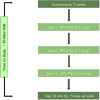Low-dose psilocybin in short-lasting unilateral neuralgiform headache attacks: results from an open-label phase Ib ascending dose study
- PMID: 39301810
- PMCID: PMC11804157
- DOI: 10.1111/head.14837
Low-dose psilocybin in short-lasting unilateral neuralgiform headache attacks: results from an open-label phase Ib ascending dose study
Abstract
Background: Short-lasting unilateral neuralgiform headache attacks (SUNHA) are trigeminal autonomic cephalalgias that feature intense and recurrent paroxysms of pain and autonomic symptoms. Many patients are left with debilitating symptoms despite best-available treatment. Psychedelics, such as the serotonin 2A partial agonist psilocybin, have shown promise in related disorders such as migraine and cluster headache. In this open-label phase Ib ascending dose study, we aimed to assess the effects of low-dose oral psilocybin with psychological support in six to 12 patients with chronic SUNHA. Study objectives were to determine effects on cognition, as well as safety, tolerability, and effects on headache severity and frequency.
Methods: Oral psilocybin in ascending doses of 5, 7.5, and 10 mg (one dose per session; three dosing sessions in total) were administered. Cognition was assessed via the Cambridge Neuropsychological Tests Automated Battery. Headache attacks were assessed via headache diaries and the six-item Headache Impact Test (HIT-6). Subjective dose intensity was assessed via the five-Dimensional Altered States of Consciousness Questionnaire (5D-ASC). The study was terminated early due to recruitment difficulties; four patients were enrolled, three of whom were study completers. Post hoc, we undertook a thematic analysis of the applicable free-text clinical trial notes from the dosing and subsequent visits (n = 22). An inductive method was employed to establish emergent themes.
Results: No significant adverse events were recorded. We were unable to collect data as planned on cognitive function during the acute experience due to high ratings of subjective dose intensity (mean 5D-ASC scores 37.8-45.7). The impact of the headaches remained severe throughout the duration of the trial (HIT-6 mean scores 64.3-65.7). There were limited effects on headache duration and severity based on the diaries; however, mean daily attack frequency decreased by >50% in two participants at final follow-up (22.9 to 11.0 and 56.4 to 28.0, respectively). Completing participants and their clinicians recorded "much" (two participants) or "minimal" improvements (one participant) at final follow-up via the Clinical Global Impression rating scale. Thematic analysis indicated that psychological insights were key features of participants' experience; these insights included re-configured relationships to their headache pain.
Conclusion: The study met with recruitment difficulties and cognition could not be assessed during the acute experience due to subjective dose intensity, likely mediated in part by expectancy effects. The clinical results provide no conclusive evidence for the use of psilocybin in SUNHA. We suggest that accounting for psychological factors in chronic SUNHA may be an important facet of treatment.
Keywords: SUNHA; headache; psilocybin; psychedelics.
© 2024 The Author(s). Headache: The Journal of Head and Face Pain published by Wiley Periodicals LLC on behalf of American Headache Society.
Conflict of interest statement
Figures


References
-
- Headache Classification Committee of the International Headache Society (IHS) . The International Classification of Headache Disorders, 3rd edition. Cephalalgia. 2018;38:1‐211. - PubMed
-
- Williams MH, Broadley SA. SUNCT and SUNA: clinical features and medical treatment. J Clin Neurosci. 2008;15:526‐534. - PubMed
Publication types
MeSH terms
Substances
Grants and funding
LinkOut - more resources
Full Text Sources
Miscellaneous

